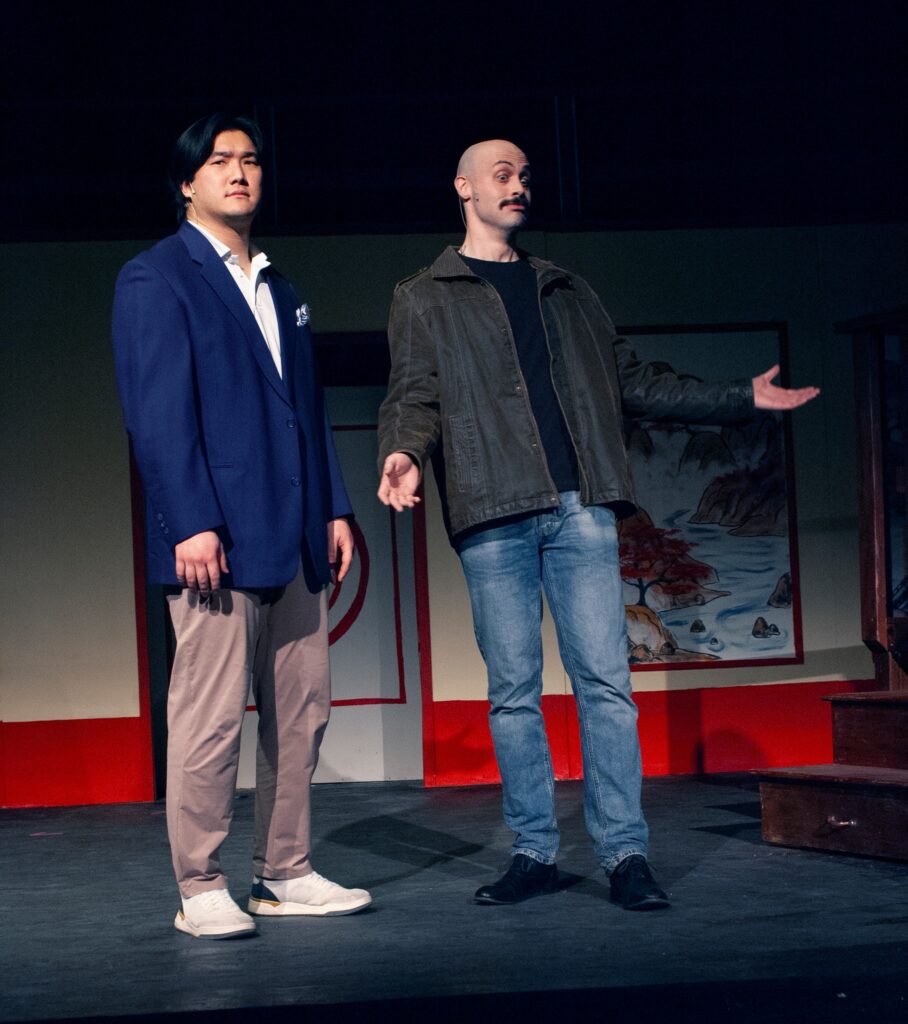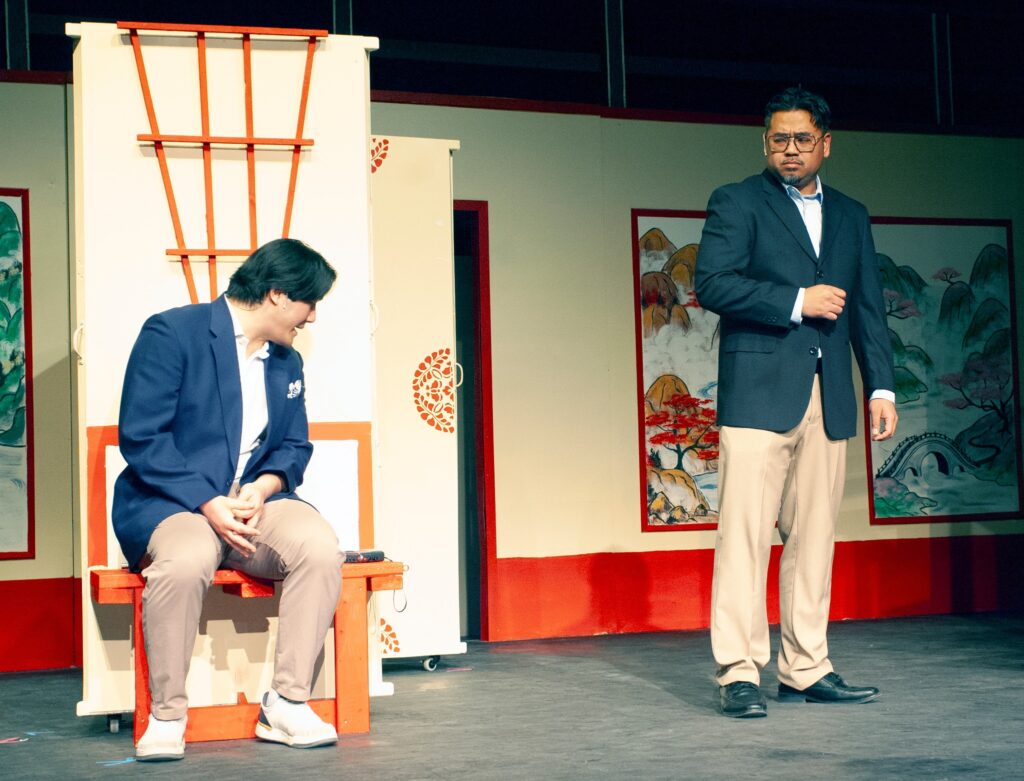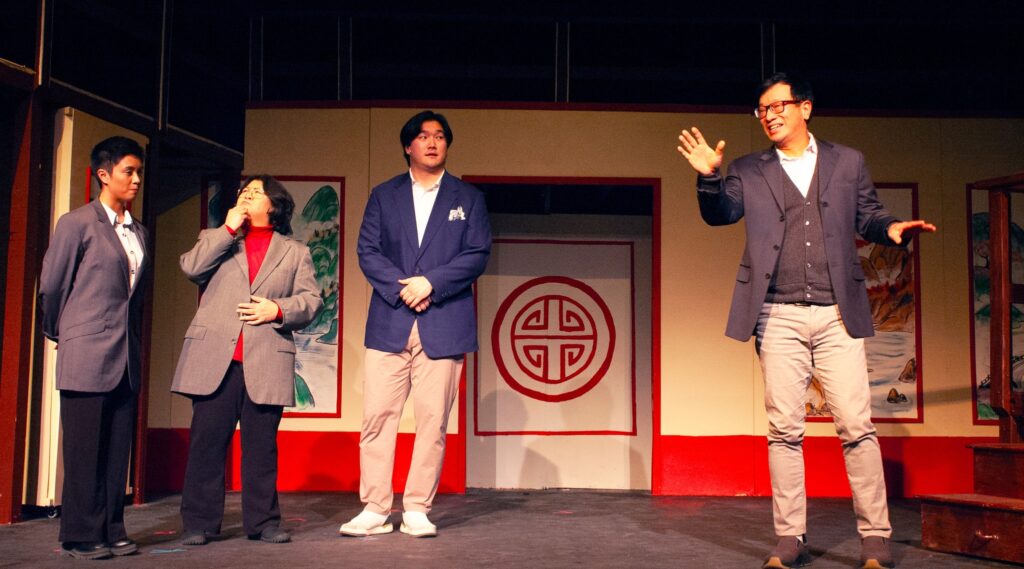
The Footlight Club presents Yellow Face by David Henry Hwang. Directed by Michelle Aguillion. Set Design by Nolan DuPont Love. Props Design by Jasmine Santos. Lighting Design by Tim Gregor. Sound Design by Chris Brousseau. Costume design by Nancy Ishihara/Emma Joyce. At The Footlight Club, 7A Eliot Street, Boston, through February 22, 2025.
Linda Chin
Even before stepping foot in the venerable Footlight Club to see their production of preeminent playwright David Henry Hwang’s Yellow Face, a hilarious and thought-provoking farce that explores the complexities theater makers face in casting shows with cultural authenticity and the prejudice and discrimination Asian Americans face in their daily lives, I admit to feeling tickled to be part of history in the making.
A playwright I’ve long admired for FOB (Fresh Off the Boat), Chinglish, M. Butterfly, for which he won a Tony for Best Play in 1988 (and is the only Asian playwright with a Tony to date), Hwang is commonly touted as the most successful and influential Asian American playwright in history. Semi-autobiographical with a fictional self-deprecating playwright, DHH, as the lead character, Yellow Face made its NYC premiere at the off-Broadway Public, where it earned an Obie but received mostly mixed reviews. Nearly two decades and some nips and tucks later, Yellow Face enjoyed a long-awaited Broadway debut run last fall and well-deserved critical acclaim – a cause for celebration. And now, FOB – Fresh Off Broadway, audiences can experience this brilliant and timely play at the oldest continuously running community theater in America (est.1877) right here in Boston. This, at a time when Americans are experiencing attacks on people of color and/or who identify as queer or trans and/or are immigrants, on DEI programs, and the performing arts, at a time when what many need most is to feel part of a community – and to laugh out loud.

It was also exciting to see headshots of cast members – faces of diverse races – and a description and timeline of historic yellowface casting practices (non-Asian actors using makeup and prosthetics to play a person of Asian heritage, often stereotyped) on a bulletin board in the lobby. Seeing a buck-toothed Mickey Rooney in Breakfast at Tiffany’s (1961), Jonathan Pryce playing a Eurasian pimp in Miss Saigon (1991) is history we can learn and grow from, but Scarlett Johansson playing Ghost in the Shell’s iconic Japanese protagonist in 2017 is a sad reminder that there is a long road ahead. I remembered discussing Asian representation in theater and seeing Hwang’s Golden Child with my mom, a Chinese immigrant, shortly before she passed and thought about how she would have loved to have seen Yellow Face on Broadway – a poignant but proud-to-be Asian moment.
Then my mom’s voice got stuck in my head about having to be better than the best all the time (as how I behaved and what I accomplished was a reflection on every Asian in the world), imposter syndrome set in, and my excitement and pride turned to worry about reviewing the show. I wanted it – needed it – to be not just good, but great; not acceptable, but A-mazing.
The Broadway version, directed by award-winning Leigh Silverman, had a sizable budget and Silverman and Hwang have a long-standing collaboration that spans decades. The Broadway version featured the star power of Daniel Kim (of Hawaii-5-O fame) as DHH and the remarkably versatile stage veteran Frances Jue (even-tempered in Hwang’s Soft Power, villainous in Lauren Yee’s Cambodian Rock Band) returned to the role of HYH (the character who is the father of playwright DHH) he originated at the Public in 2007. They, too, earned rave reviews for their masterful performances. How would The Footlight Club production fill these big shoes?

Yellow Face was inspired by several real-life experiences Hwang faced in the ‘90s: He actively protested the “miscasting” in Miss Saigon in 1990, but it went on – with Pryce in the lead role – to be a Broadway hit; in 1993, Hwang’s comedy about mistaken racial identity, Face Value, premiered in Boston and went to Broadway, but closed during previews. Also central to Yellow Face is David Henry Hwang’s father, Henry Yuan Hwang, a successful immigrant from China who fiercely believed in the American Dream, founded the first Asian American-owned bank, which was placed under scrutiny in 1999 for allegedly laundering money from China. (As a footnote, much to DHH’s consternation, HYH was a big fan of Miss Saigon, and suggests that his son write a play more like it instead of the “weird” M. Butterfly).
With an impressive mastery of his craft, Hwang wove these not-so-flattering events into a play that 2024 audiences were ready for and receptive to (including perhaps young audience members who were 17 years younger or not yet born in 2007?). Here in Boston, with her impressive range of storytelling skills (playwright, actor, producer, director), lived experience, and collaborative, empowering style, director Michelle Aguillon (Middleton Heights at Umbrella Stage, Proof at Central Square) has helmed a production of Yellow Face to be proud of. The cast of ten actors – diverse in age, race, identity and stage experience – are a well-oiled ensemble, a stage family that has each other’s back, and their excitement about the material and the opportunity to tell the story shows. The two-level unit set structure (designed by Nolan DuPont Love) supports the play’s depiction of different worlds (Boston, NY, California and China?) and allows for a variety of stage pictures that keep the actors getting their steps in and the audience engaged.
The ten actors play over 20+ characters. Actors Mordecai S.J. Choi and Michael Tow are masterful in their respective – and respectful – portrayals of DHH and HYH, respectively. Hwang’s script includes dozens of fictitious and real people (Ed Koch, Gish Jen, Cameron MacIntosh), and the other eight actors are tasked with playing multiple roles, which director Aguillion has assigned to individual actors based on their strengths/to expand their repertoire, resulting in a wonderful mashup of genders, races, voices and personalities and a lot of laughs. Kudos to Audrey Adji (Lea Cho & others), Bradley Belanger (Marcus Gee & others), Jenine Florence Jacinto (Carla Chang, Mark Linn Baker, Beatrice Chang & others), Abby Kesselman (Jane Krakowski & others), David J. Kim (DHH understudy, Sen. John Kerry & others), Vivian Liu-Somers (Frank Chin, Margaret Chung, Dorothy Hwang & others), Chantha Luk (BD Wong, NWOTAOC & others), Kayla Maloney (Stuart Ostrow, Julia Dahlman & others).
Many of the two-hander scenes (between acclaimed Asian American actor-in-real life BD Wong and DHH, Asian wannabe Marcus Gee and Jane Krakowski, Dorothy Hwang and her husband or son) were particularly hysterical and spot-on. Same for the scene when DHH had a Q&A about casting mishaps with a group of AAPI student activists.

Comedy aside, Yellow Face is David Henry Hwang’s love letter to his father and to theater, making the answer to my earlier question about who would fill the big shoes of Daniel Kim and Francis Jue important. With their sensitive acting portrayals of DHH and HYH, and real-life hunkiness, actors Mordecai Choi and Michael Tow stole their scenes and my heart. For more information and tickets, go to: https://www.footlight.org/

